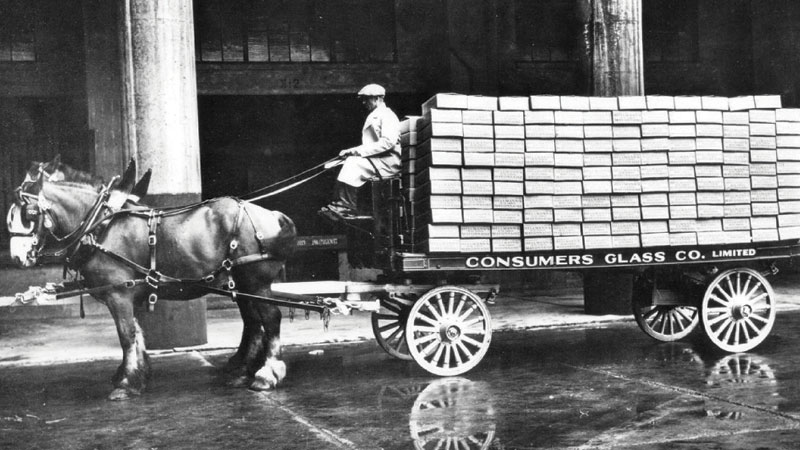Drive anywhere across Canada – from Vancouver to St. John’s, or as far north as Whitehorse – and on passing trucks you’re sure to see the familiar logo of Canada Cartage and “the beaver.”
And while the 108-year-old company is well-known for trucking, the firm has quietly been building up a significant market presence in eCommerce fulfillment, managed transportation services, and final mile home deliveries. “Everyone knows us as ‘the company with the beaver on the trucks,’” says President Jeff Lindsay. “But 30% of our revenues now come from our logistics services, and in the next few years, these solutions will continue to grow to be a larger part of our overall business mix. It’s been exciting to build and grow these new services, while never losing sight of what’s made us successful on the transport side of our business.”
Founded in Toronto in 1914 by Scottish immigrant Robert Leslie, Canada Cartage came by its name honestly – the first “vehicles” were carts pulled by a single horse or team of horses. The basic concept of the business then is largely the same today – providing dedicated contract carriage for customers for short- and regional-haul work. The horse carts back then were often branded with the customer’s name – just as many Canada Cartage trucks today are branded with customer logos and colours.
Until 2006, the company was primarily an Ontario and Québec regional carrier. However, that year, they acquired Winnipeg-based Direct Integrated Transportation. The deal almost doubled the size of the company overnight, and turned Canada Cartage into a national player. “At that time, many of our large national accounts were looking for a dedicated service provider that could provide service in both Eastern and Western Canada,” said Lindsay. “Direct had a virtually identical business model in the West, and we shared many of the same national accounts. It was a perfect fit for us, and for our customers.”
Fast forward to today: Canada Cartage is one of the largest trucking firms in Canada with over 4,100 employees and owner-operators, and approximately 3,000 tractors and 3,000 trailers. The firm is the market leader in dedicated contract carriage (or DCC), which provides integrated trucking and outsourced fleet management solutions for the benefit of a single customer, including equipment, drivers, dispatching and technology systems.
The primary customer segments are retailers, grocery and pharmacy chains, food and beverage manufacturers, beer and alcohol retailers and manufacturers, and industrial companies serving the building, construction, and specialty gases industries. The company’s scale of operations makes it adept at handling volume surges for their customers, so that they can deploy trucks and drivers on short notice to meet weekly, monthly, or seasonal volume spikes. “Our ‘surge protection’ capability allows us to right-size our customer’s fleets for their normal shipping volumes, but ramp up to meet their peak periods – it’s extremely cost-effective for them in the long run,” said Lindsay.
The company also works alongside many private fleets, including several PMTC member-companies, providing additional trucks, drivers, recruiting, hiring, and fleet support services.
With more Canadians purchasing products online, eCommerce trends are driving significant growth for Canada Cartage’s fulfillment and distribution division, CCLS (Canada Cartage Logistics Solutions). CCLS now has 11 fulfillment centers across Canada, and over
1.4 million square feet of warehouse space. They offer a number of value-added fulfillment services including consolidations, cross-docking, “pick and pack,” kitting, assembly, labelling and packaging services, as well as reverse logistics for product returns. A particular area of focus is on Health Canada regulated products such as cosmetics, beauty care, and natural health products. Many of the facilities hold Health Canada site licenses and have strict compliance protocols and GMP processes in place to managed controlled goods.
CCLS also has a managed transportation group, which acts as an outsourced freight department for their customers. The managed transport team works to optimize the customer’s supply chain by using a combination of supply chain engineering, technology tools, and buying power with carriers and couriers. They take care of shipping order entry, load tendering, shipment visibility, billing and payments, freight audit and key performance indicator reporting. The company facilitates the delivery of almost 5 million parcels per year to consumers across Canada, as well as arranging shipping via multi-modes including ground, air, rail, and ocean shipments.
The other consumer trend that Canada Cartage is targeting for growth is the online purchasing of large, oversize products. The pandemic accelerated online purchasing in general, but there was a significant shift in consumers’ willingness to order oversized items such as furniture, mattresses, exercise equipment, and patio sets. Traditional courier companies typically steer clear of these products – which they refer to as “non-conveyables” since they cannot be handled through their large, automated processing centers. Retailers and manufacturers are turning to companies like Canada Cartage that have one- and two-man crews, specialized delivery equipment, and offer “white glove” delivery treatment. “The delivery of products into a consumer’s home is the final touchpoint that a retailer has with their customer – it has to be perfect, or they might not get repeat business. Our customer service starts with arranging delivery when it suits the consumer, and then we keep them updated every step of the way through a combination of our online tracking app and our customer service teams”, says Lindsay. On delivery day, “our crews literally wear white gloves – as well as white booties – and take care of all the details from carrying into the room of choice, to assembly, and clean-up of packaging materials,” said Lindsay. “Our customers are trusting us with their brand…we take it seriously and make sure their consumers have a great delivery experience.”
Canada Cartage has come a long way from that first horse and cart back in 1914. We’re not sure Robert Leslie would recognize his old company, but no doubt he’d be proud of what he started.



